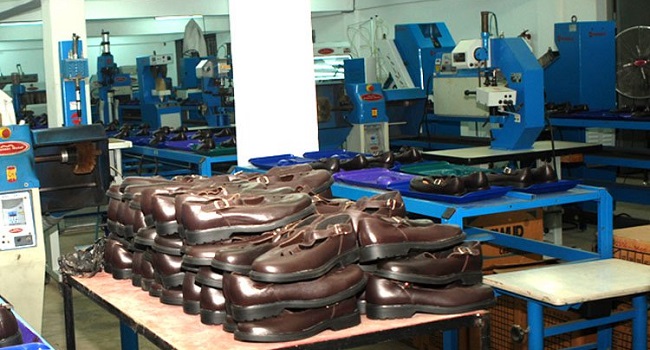Business
NIGERIA’S LOCAL SHOE INDUSTRY: A goldmine waiting to be exploited

It is 11:30am and traders and buyers who had come from different parts of the country were seen moving from one direction to the other at the popular Ariaria international market located in Aba, a bustling commercial hub in Abia state, South Eastern Nigeria.
“Your shoes here”! Your shoes here”! Sir, this one is very strong and will last longer,” 30-year-old Ikechukwu Ani said, shouting on top of his tiny voice as he tries to attract buyers to his displayed shoes.
“You will like this one,” he continued lifting a brown pair of shoes with a stitched design. “I made it with quality leather material,” he said squeezing the leather of the shoes with both hands to show the strength of the material.
The Ariaria international market located in Aba is the hub of shoe manufacturing in Nigeria and West African region with traders from Chad, Ghana, Togo, Niger Republic and African region with traders from Chad, Ghana, Togo, Niger Republic and Cameroon trooping to the market every week to buy shoes and other leather materials for resell in their countries. And when they won’t make it to the market, they send their product specifications to the local shoe manufacturers via text messages or phone calls for onward production and transportation to their destinations.
Every week, more than one million pairs of shoes are exported from Ariaria international market to the West African coast.
With just stove, thread and gum which is applied on the sole of a shoe, a shoe maker can produce 5-10 shoes in a day which sells between N6000 ($19.08) for shoes, N8500 ($27.03) for army boots and N3500 ($11.13) for sandals.
The market has created thousands of employment for the young working population as Nigeria struggles to come out of recession. Unofficial records show the market contributes about 60 per cent of the state’s N2 billion ($10 million) monthly Internally Generated Revenue (IGR).
In 2013, the manufacturing sector contributed more than 22 percent of Nigeria’s Gross Domestic Product, a slight increase from the 14 percent of the previous year.
Last month, the Nigerian army ordered the production and delivery of 50,000 pairs of military boots estimated at N300 million ($954, 000).
“I left my village in 2003 to come here to learn shoe making,” said Chinazor Onyeabor, 35, who came to the commercial city ten years ago as an apprentice. “I am married with three children and it has been good for me,” he said using a dirty green cloth to wipe off the dust on the shoes displayed in front of his shop.
“I didn’t learn shoe making. It is a talent,” said Nnedinso Omeh, 21, a college student who is breaking the glass ceiling by being one of the few female shoemakers.
“I am training myself in school with this but I need support from the government to produce more shoes,” she said applying gum to the sole of a shoe she was making.
The Aba shoe industry has not only created employment for thousands of unemployed youths, it has also attracted foreign investors who are readying to start large scale production in the city.
Recently, the governor of the state, Mr Okezie Ikpeazu signed a $1.5 billion deal with a Chinese shoe industry during the 1st Nigeria-China Governors Investment Forum. The deal tagged “Abia-Huajian Shoe Industrial City” is expected to manufacture about 5,000 shoes per day and provide about 10,000 direct and indirect employment.
Read also: Special Report: The slumbering economic giant called Ariaria market
The industrial city production would target 80 percent export to meet existing Huajian international orders while 20 percent goes for the Nigerian market. The Hujian Group, valued at $2 billion, currently employs about 20,000 staff in China and operates a 10,000 shoe per day factory.
Last year, the state government started the “Made-In-Aba” campaign as a way of attracting foreign investors to the state and promoting the locally made shoes to major markets around the world.
“This deal will change the fortunes of the traders positively,” Mike Ugwu, an expert in the manufacturing industry told Ripples Nigeria. “This deal will open doors for more investors, encourage favourable competition among the manufacturers.”
In spite of these promises of a booming shoe industry, some challenges still stare the shoe makers and their local industries in the face.
Power outages are regular and random and this affects production. Also, in recent times, the cost of materials like leather, thread and adhesive gums are relatively expensive depending on the quality. This has reduced the number of shoes produced daily. Credit loans are also not available for the shoe makers to access.
“Sometimes we don’t have light for a whole month,” said Mr Ani who uses cooking stove to produce light. “If we are provided with all we need, we will become the largest shoe industry in the world.”
By Patrick Egwu Ejike…
Join the conversation
Opinions
Support Ripples Nigeria, hold up solutions journalism
Balanced, fearless journalism driven by data comes at huge financial costs.
As a media platform, we hold leadership accountable and will not trade the right to press freedom and free speech for a piece of cake.
If you like what we do, and are ready to uphold solutions journalism, kindly donate to the Ripples Nigeria cause.
Your support would help to ensure that citizens and institutions continue to have free access to credible and reliable information for societal development.